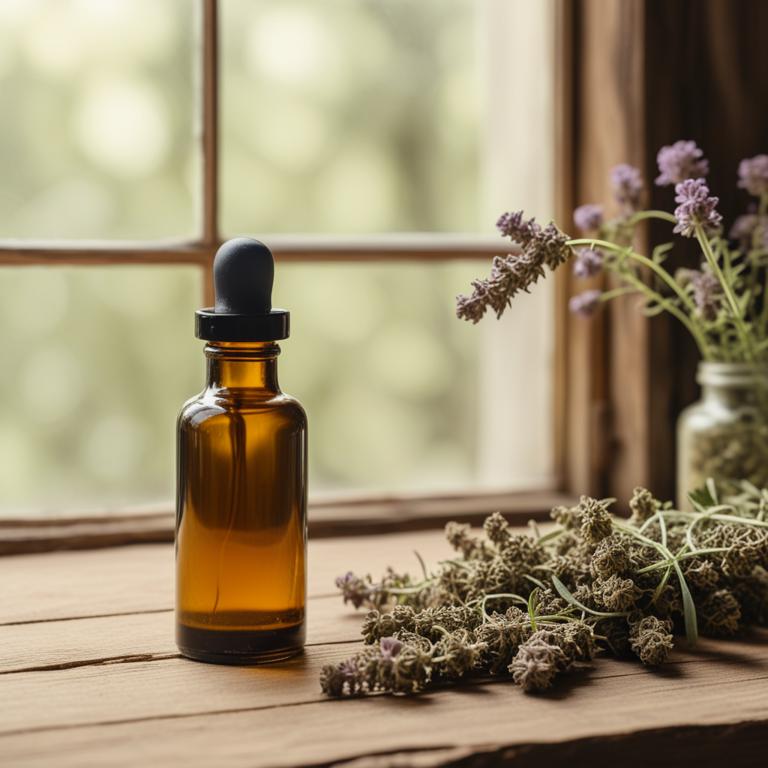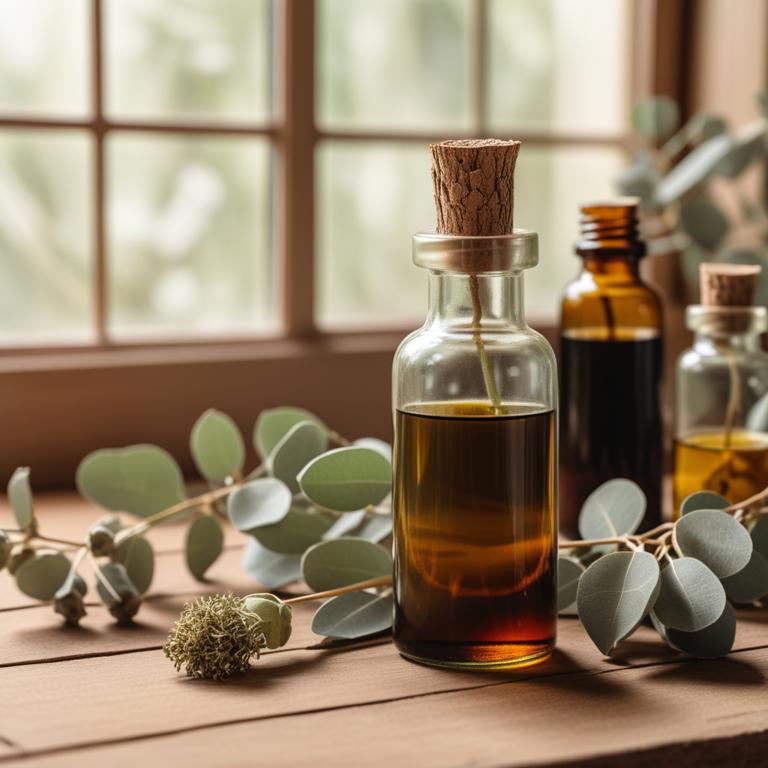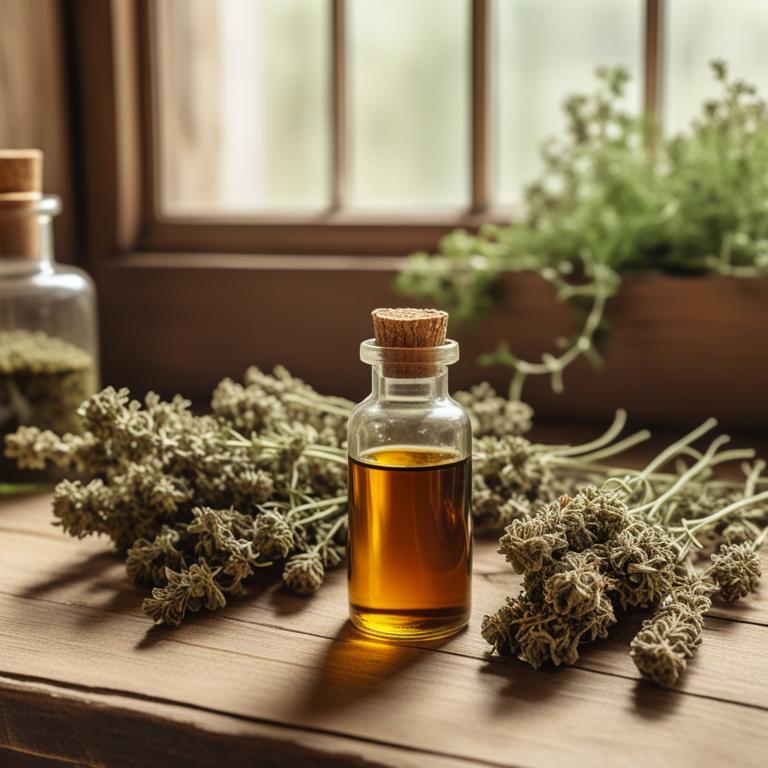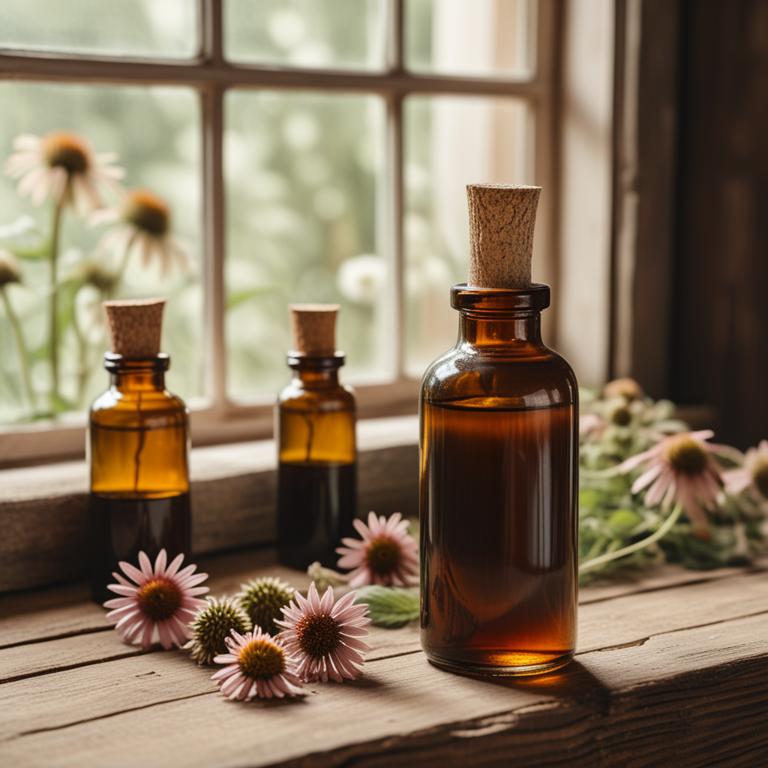7 Best Herbal Tinctures For Bronchitis

Herbal tinctures for Bronchitis are concentrated liquid extracts made from various herbs and plants that have been traditionally used to alleviate the symptoms of bronchitis, a respiratory condition characterized by inflammation and congestion in the lungs.
These tinctures offer numerous benefits in treating bronchitis, including reducing inflammation, soothing a sore throat, and loosening mucus, allowing for easier breathing.
Some examples of herbal tinctures used to treat bronchitis include Echinacea, which boosts the immune system and fights off infections, Thyme, which has antimicrobial properties to combat bacterial overgrowth, and Ginger, which helps to reduce inflammation and soothe a sore throat.
Additionally, other herbs such as Slippery Elm, Licorice Root, and Wild Indigo are also used to treat bronchitis due to their anti-inflammatory, expectorant, and antimicrobial properties, making them a popular natural remedy for this condition.
According to "The Korean journal of internal medicine", tinctures for bronchitis, such as HL301, have been shown to be effective and safe for symptomatic treatment of acute bronchitis, with significant improvements in bronchitis severity score and other efficacy variables.
Below there's a list of the 7 best herbal tinctures for bronchitis.
- 1. Eucalyptus globulus tinctures
- 2. Echinacea purpurea tinctures
- 3. Thymus vulgaris tinctures
- 4. Eucalyptus radiata tinctures
- 5. Zingiber officinale tinctures
- 6. Echinacea angustifolia tinctures
- 7. Eucalyptus staigeriana tinctures
Also you may be interested in...
TODAY'S FREE BOUNDLE
Herb Drying Checklist + Herbal Tea Shopping List + Medicinal Herbs Flashcards
Enter you best email address below to receive this bundle (3 product valued $19.95) for FREE + exclusive access to The Aphotecary Letter.
$19.95 -> $0.00
1. Eucalyptus globulus tinctures

Eucalyptus globulus tinctures have been traditionally used to treat bronchitis due to their decongestant, anti-inflammatory, and expectorant properties.
The tincture helps to relieve bronchitis symptoms by reducing inflammation in the airways, thinning mucus, and making it easier to cough up, thereby providing quick relief.
The bioactive constituents, including eucalyptol, limonene, and alpha-pinene, are responsible for these therapeutic effects, which help to alleviate congestion and cough associated with bronchitis.
Regular use of Eucalyptus globulus tinctures can provide benefits such as reduced frequency of exacerbations, improved respiratory function, and enhanced overall well-being for individuals suffering from bronchitis.
Related Study
According to "Zhongguo Zhong yao za zhi = Zhongguo zhongyao zazhi = China journal of Chinese materia medica", Eucalyptus globulus tinctures for bronchitis may be beneficial as E. globulus oil was found to significantly reduce inflammatory cell infiltration, bronchiolitis severity, and mucin content in bronchoalveolar lavage fluid, indicating its potential anti-inflammatory and mucin-hypersecretion inhibitory effects.
2. Echinacea purpurea tinctures

Echinacea purpurea tinctures have been traditionally used to help alleviate symptoms of bronchitis, a common respiratory condition characterized by inflammation and congestion in the airways.
The anti-inflammatory and immunomodulatory properties of this herbal preparation help to reduce inflammation and modulate the immune response, making it easier for the body to fight off underlying infections.
The bioactive constituents, including alkylamides and polyphenols, present in Echinacea purpurea tinctures have been shown to exhibit bronchodilatory and antimicrobial activities, which contribute to its therapeutic effects in treating bronchitis.
By using Echinacea purpurea tinctures, individuals may experience relief from coughing, congestion, and other symptoms associated with bronchitis, highlighting its potential as a complementary treatment approach.
Related Study
According to the given study, Echinacea purpurea tinctures may exhibit potential for adjuvant symptomatic therapy in respiratory conditions, such as bronchitis, suggesting a possible use in treating bronchitis.
3. Thymus vulgaris tinctures

Thymus vulgaris tinctures, derived from the leaves of the thyme plant, have been traditionally used to treat bronchitis due to their antimicrobial and anti-inflammatory properties.
The bioactive constituents present in thyme tinctures, such as thymol and carvacrol, help to combat the underlying bacterial and viral infections that cause bronchitis, thereby reducing inflammation and congestion in the respiratory tract.
By acting as a natural expectorant, thyme tinctures help to loosen and clear mucus from the lungs, making it easier to breathe and relieving symptoms of bronchitis.
The benefits of using thyme tinctures to treat bronchitis include reduced risk of complications, improved respiratory function, and a natural alternative to conventional medications.
Related Study
According to "Wiadomosci lekarskie (Warsaw, Poland : 1960)", Thymus vulgaris tinctures for bronchitis have been found to be effective in alleviating cough and dyspnea, and shortening the length of the disease, comparable to synthetic ambroxol.
4. Eucalyptus radiata tinctures

Eucalyptus radiata tinctures have been traditionally used to treat bronchitis, a respiratory condition characterized by inflammation and congestion in the airways.
The antiseptic, anti-inflammatory, and decongestant properties of this herbal preparation help to soothe and clear the airways, making it easier to breathe.
The bioactive constituents, including cineole, alpha-pinene, and eucalyptol, exhibit potent expectorant and mucolytic properties, which help to thin mucus and promote its expulsion from the lungs.
By utilizing Eucalyptus radiata tinctures, individuals can benefit from rapid relief from bronchitis symptoms, improved respiratory function, and a reduction in the risk of complications associated with this condition.
Related Study
According to the provided study, Eucalyptus radiata tinctures have been found to have positive effects on bronchodilation, pulmonary function tests, and the antagonism of asthma mediators, such as histamine and platelet activating factor, which may help alleviate symptoms of bronchitis.
5. Zingiber officinale tinctures

Zingiber officinale tinctures, derived from the rhizome of the ginger plant, have been traditionally used to treat bronchitis due to their anti-inflammatory and expectorant properties.
The bioactive constituents, including gingerols and shogaols, help to reduce inflammation and alleviate cough and congestion associated with bronchitis.
By stimulating mucus secretion and promoting its expulsion from the respiratory tract, Zingiber officinale tinctures help to clear the airways and provide relief from bronchitis symptoms.
The benefits of using Zingiber officinale tinctures to treat bronchitis include reduced inflammation, improved respiratory function, and a faster recovery time, making it a popular natural remedy for this common ailment.
Related Study
According to "Recent patents on biotechnology", Zingiber officinale tinctures have potential for adjuvant symptomatic therapy in respiratory conditions, including bronchitis, due to the presence of bioactive compounds in the plant.
6. Echinacea angustifolia tinctures

Echinacea angustifolia tinctures have been traditionally used to help alleviate symptoms of bronchitis, a respiratory infection characterized by inflammation and congestion in the airways.
The bioactive constituents present in this herbal preparation, including alkylamides, glycosides, and phenolic acids, possess anti-inflammatory, immunomodulatory, and antiviral properties that help to combat the underlying causes of bronchitis.
By modulating the immune system and reducing inflammation, Echinacea angustifolia tinctures may help to relieve symptoms such as coughing, wheezing, and shortness of breath associated with bronchitis.
Regular use of this herbal preparation may also help to prevent future respiratory infections and promote overall respiratory health.
7. Eucalyptus staigeriana tinctures

Eucalyptus staigeriana tinctures have been traditionally used to treat bronchitis, an inflammatory condition of the airways, due to their decongestant and anti-inflammatory properties.
The herbal preparation helps to treat bronchitis by relieving congestion, reducing inflammation, and easing coughs, providing relief from the symptoms associated with this condition.
The bioactive constituents of Eucalyptus staigeriana tinctures, including eucalyptol, limonene, and alpha-pinene, are responsible for its medicinal properties, which help to open up airways and reduce inflammation.
The benefits of using Eucalyptus staigeriana tinctures to treat bronchitis include rapid relief from symptoms, reduced risk of complications, and a non-invasive, natural approach to managing this common respiratory condition.